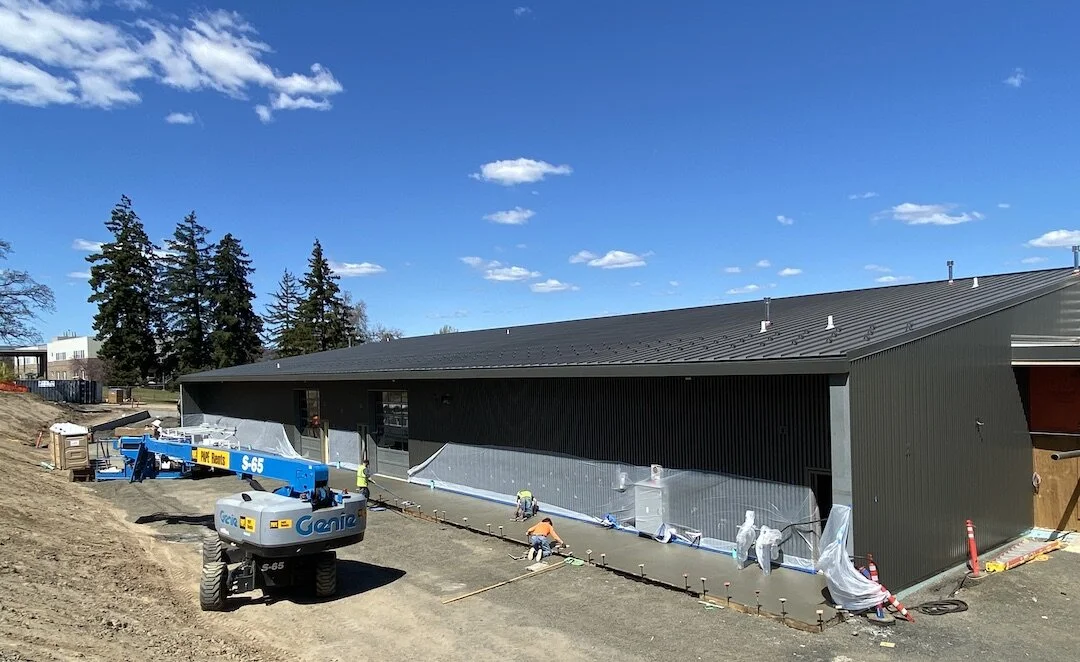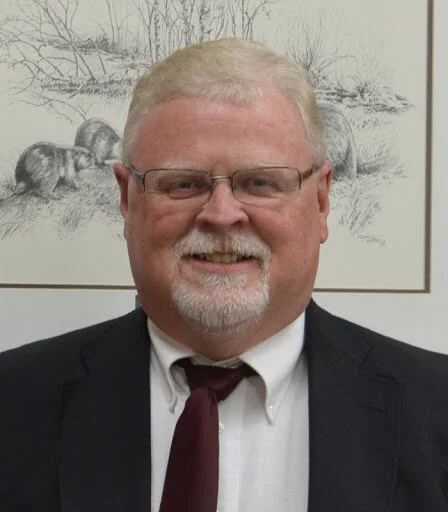TD Council Probing Process to Spend Google Funds
Concrete workers put a smooth finish on the sidewalk in front of the Skill Center at Columbia Gorge Community College on Thursday, April 15. Google Payments of $1.8 million annually to the City and Wasco County helped make this $14.6- million project possible. The Dalles City Council is now pondering the selection process of such future projects.
By Tom Peterson
How should Google fees and payments be best spent by the City of The Dalles?
That is a question City Councillors are pondering as they are looking for a best practice to vet and rank projects that will elicit the greater good for the community.
In other words, what would make The Dalles a better place to live?
Better schools? Better streets? Better parks? Better Jobs? What? And which comes first?
The issue arose at Monday’s City Council Meeting.
Here’s why.
Currently Google is paying $1.8 million annually, split to Wasco County and City on its Taylor Lake facility enterprise zone agreement.
The payment hits the bank in December. And it is currently earmarked for Columbia Gorge Community College’s student housing and skill center project for this year. The final payoff is this December.
So, those funds will become available for other projects in 2022. And that could just be the tip of the iceberg. Those annual payments could balloon to $6 million-plus annually if Google follows through with a new agreement and a proposal to build as many as two new data centers at a cost of $1.2 billion.
Those payments would go on for 20 plus years. It adds up to $125 million by some estimates. That’s a lot of money - and an opportunity that most communities do not have as funds are typically pigeonholed for very specific projects or categories such as potable water.
Councilor Dan Richardson
Not so in this case. Money can be spent on what officials deem best. A lot of judgment comes into play.
On Monday, April 12, Councilor Dan Richardson suggested the City staff study the allocation process to come up with a “best fit” for the city.
“It behooves us to kick the tires on this thing,” he said.
“You are asking the staff to come up with a different process… that compliments the (Wasco County) Economic Development Commission that is more city-centric or has more city representation,” said Mayor Rich Mays.
“I would like a second opinion,” Richardson confirmed.
The comments come after managers of the joint enterprise zone for the City and County, Matthew Klebes and Carrie Pipinich presented the current process for determining how to spend the Taylor Lake funds and or additional monies coming through state, federal or private sources.
Essentially the EDC holds meetings, takes input from people and communities throughout the county, vets proposals and then presents them to the EDC for prioritization.
The current EDC board is made up of the following, according to the Wasco County Website:
Position 1 - Brian McCormick (Northern)
Position 2 - Tonya Brumley (Central)
Position 3 - Amy McNamee (Southern)
Position 4 - Mike Courtney (Port of The Dalles)
Position 5 -Rich Mays (City of The Dalles)
Position 6 - Lisa Farquharson (Chambers of Commerce)
Position 7 - Bob Krein (At-Large, Dryland Ag/Cattle focus)
Position 8 - Megan Thompson, Chair (At-Large, Fruitgrowers focus)
Position 9 - Fritz Ellett (At-Large)
Position 10 - Nan Wimmers, Vice Chair (At-Large)
Position 11 - Justin Brock (At-Large, Utilities focus)
Klebes said the city could choose to fund a portion of an EDC project with Google payments, leaving money for city projects.
Councilor Tim McGlothlin
Councilor Tim McGlothlin said the current EDC Board provided a good cross-section of the community, and he was in favor of retaining the current EDC process of selecting and prioritizing projects.
However, Mays taking direction from a majority of Councilors, directed City Manager Julie Krueger to look into the process and present an alternative for the Council to consider or compare. Krueger said the work would take a month at minimum to complete.
In other Business, Councilors unanimously approved the following:
Dog River Timber Removal
Councilors gave the approval to contract WyEast Timber Services LLC located in Hood River for timber consulting services at a cost of $68,000 to $75,000 with a maximum limit of $82,000. Wyeast will now assess the timber and its removal along the Dog River Pipeline cleaning the way for construction of the new pipeline in 2022.
Road Work
Councilors authorized the expenditure of $71.720 to Sierra Santa Fe for the scrub seal of Bridge Street from 10th to 14th streets and East Scenic Drive from the Sorosis Park entrance to East 15th Place. A scrub seal essentially performs both the crack sealing and the chip seal of the asphalt at the same time.
ADA Concrete Ramp Installation.
Councilors authorized the City Manager to enter into a contract with Van Nevel Concrete and Curb for the 2021 ADA Improvement Project in an amount not to exceed $217,414.17. The job includes the construction of 27 curb ramps for people using wheelchairs.



